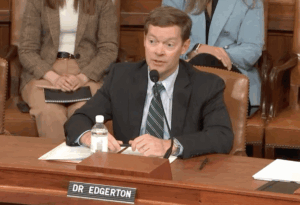
Dr. Edgerton testifying in front of the Ways and Means Subcommittee on April 8, 2025.
On April 8, rheumatologist and ACR Board of Directors member Colin Edgerton, MD, FACP, RhMSUS, testified before the U.S. House of Representatives Ways and Means Health Subcommittee to address challenges with biosimilars.
Although biosimilars were brought to the market as lower-cost alternatives to biologics, pharmaceutical companies have received pressure from insurers and pharmacy benefit managers (PBMs) to offer rebates for preferred formulary placement.
During the hearing, “Lowering Costs for Patients: The Health of the Biosimilar Market,” Dr. Edgerton’s testimony addressed how these rebates result in provider reimbursement at rates lower than their acquisition cost. Dr. Edgerton, of Articularis Healthcare in Charleston, S. C., is a former chair of the ACR’s Committee on Rheumatologic Care.
“The gap between the cost of acquiring biosimilar treatments for administration to patients and the amount we are reimbursed upon administering those treatments is negatively impacting both physician practices and access to care for millions of patients suffering from chronic diseases,” Dr. Edgerton told the subcommittee members.
“If the reimbursement does not cover the acquisition cost of the biosimilar, physicians will be operating at a financial loss. This leads to unsustainable practice economics, especially in high-volume settings, such as rheumatology, where biologics are a central part of patient care,” Dr. Edgerton testified.
The rebates are factored into the manufacturers’ quarterly average sales price (ASP) reported to the Centers for Medicare & Medicaid Services (CMS), artificially lowering the ASP such that many providers’ acquisition costs substantially exceeded Medicare and other private health plan payments.
Dr. Edgerton, who is a former U.S. Army physician, pointed out that these financial strains are coupled with record inflation and nearly annual reimbursement cuts in the Medicare Physician Fee Schedule.
“As a result, medical practices may face the choice of either reducing services, refusing certain patients or even closing due to financial stress,” he said.
In Search of Solutions
In response to these challenges, he noted, the ACR and the Coalition of State Rheumatology Organizations are co-leading the Underwater Biosimilars Coalition to support legislation for one of the following:
- Amend Section 1847(b) of the Social Security Act to temporarily provide an 8% add-on to the providers’ acquisition cost of all biosimilar products;
- Amend Section 1847A(c)(4) to extend the Secretary’s authority to use wholesale acquisition cost + 3% until the ASP reaches sustainable levels; or
- Amend Section 1847A(c)(3) to permanently remove manufacturer rebates from the ASP methodology for biosimilars.
Dr. Edgerton said he felt honored to be called to testify and was pleased that subcommittee members had an understanding of the formulary restrictions primarily promulgated by PBMs. However, he still had some concerns.



